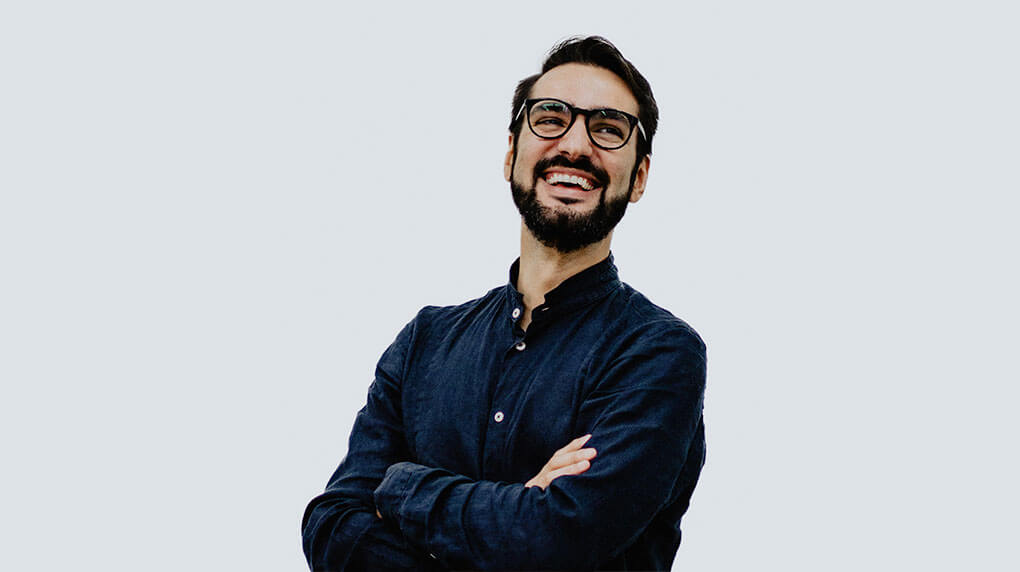This is part 2 of a 2-part series. Read part 1 here.
For World Creativity and Innovation Day, we sat down with four members of the creative department at Major Tom. They weighed in on their own personal habits they use to overcome creative blocks, where they find inspiration and what it means to have Imposter Syndrome.
Ed started building user experiences in 2009 as an industrial designer, combining art, business, and engineering to create usable products. He moved into service design and UX six years later. When Ed works with branding and packaging, he cites nature as his biggest inspiration, pulling influence from biomimetics.

Ed: “Music and headphones is my go-to when I have to start something new and dig deep into it! I also like to be mentally prepared for the challenge — I like to sleep on the problem if possible, and have a block of hours dedicated to solving it on the following day.”
Sleeping on it is a tried and true method of working through difficult problems. REM sleep can help to link together thoughts in a novel way. Have you ever woken up in the morning and immediately started jotting down notes about a current project or paper? That’s REM helping you out.
Ed: “As a designer, my main goal is to solve problems. Mind maps, prioritization, pros and cons notes are super helpful! I notice that when I experience some blocks, it is usually because I'm missing some information, or some project decision needs to be made before I move forward with finding a solution. “What problem am I solving?” is always the first question I ask myself.”
The question Ed asks himself can be applied to many mediums. When writing anything, ask yourself an iteration of the same thing: “What argument am I making?”. Starting a project with a clear destination in mind keeps you focused.
Ed: “I believe having WFH days positively affects productivity, however, it's important to make yourself available and interact with people. Being creative is about finding different approaches to the same problem, and different mindsets will help you with this.”
The creative department at Major Tom sets aside specific time twice a week where they can bounce ideas or issues off of each other, looking for creative solutions or fresh perspectives. The meetings encourage creative discussions and have led to some innovative end results. The takeaway: agencies and individuals working from home can benefit from setting a specific time to interact with each other, especially with an open forum for working through creative issues.
Ed: “I often overthink people's reaction to my ideas, comments, and more. My first advice is: Don't overthink it! The second thing comes from my old boss, which I really admire: Don't be afraid to say "I don't know". He used to say that quite often and this instilled the team's creativity.”
Admitting when you don’t know something can be intimidating but ultimately is rewarding. You will become more competent and it allows your peers the opportunity to teach you something. Saying “I don’t know” can help you advance in all areas of your life, both personal and professional.
Carolina Horna fell into social media management during her career in community relations. Coordinating community events for a real estate developer, she relied on social media as a promotional tool, leading her to a career in digital marketing.
Carolina finds inspiration all around herself, in social media, podcasts, quotes, music, the people that surround her, and nature.

Carolina: “MUSIC! I find when I'm struggling to get in the zone, music is the perfect way to focus my attention. Perhaps it's the white noise or the way I've conditioned myself, but anytime the earbuds go on, I have mentally prepared myself to take care of business.
As for mantras, these days I find myself repeating "Just start somewhere." There are times I get paralyzed by the amount of work I know something is going to take. Which only helps me procrastinate a task even more. By repeating this to myself, I remind myself that smaller tasks chip away at the bigger task as a whole and I CAN get it done.”
Carolina’s mantra, “just start somewhere” is similar to Desmond Tutu’s quote, “There is only one way to eat an elephant: a bite at a time.” Sometimes when the task at hand seems overwhelming, it’s best to make a list and start checking it off.
Carolina: “I've been trying to walk and run more these days, maintaining a safe distance of course. Since we're cooped up indoors, the same environment every single day starts to feel stale. Changing the scenery and doing something physical takes me out of my head, giving me the mental break to allow my mind to wander and stumble upon solutions I otherwise would not have seen before.
When I can't get out due to weather or the time of day, I try to do something else creative (ie. photography, write, or paint). I like to assign myself personal projects, whether it's a theme for a photo shoot or trying to paint something online, when I pull a mental switch like this (doing something I enjoy), I either create that mental break I needed by doing something manual or I challenge myself to think in a different way.”
Your mind can associate feelings with places, so switching up your environment can help combat frustration or stagnated thoughts.
Carolina: “I feel Imposter Syndrome all the damn time! It's hard to shake and while I don't think it ever fully goes away, I do think there are ways to manage it.
At the end of the day, Imposter Syndrome is an insecurity. Like any insecurity, that stems from a fear that you can acknowledge and refute.
While I know I'm not the best at everything, I try to focus on the things I am good at that make me an expert in my field or uniquely positioned to do what I do best. So for instance, instead of lying to myself and saying "I'm the best analytics person ever", I remind myself daily that "I am a smart and creative person who has good ideas and valid opinions." After a while, this reassurance mentally arms me for the moments my negativity creeps in.
Second, I'm pretty sentimental, so I also like to save notes or praise from other people (friends, team members, family, etc.) that I can refer to when I need a boost.
Third, I like to go through my past work, whether it's projects, photography artwork, blog posts, etc. I like to use these trips down memory lane as either inspiration or validation. Sometimes I surprise myself with my past ideas, execution, and talents.
Finally, I like to do new things that scare me. I haven't done this in a while, but when the opportunities come up, I feel it in my gut and I try to say "yes" to the experience. There's no better way to prove you're a capable person, then by putting yourself to the test.”
Acknowledging and refuting your Imposter Syndrome can come in many forms, one of which is talking back to your inner critic, much like Carolina does when she focuses on the things she is good at that make her an expert in her field. Backing it up with external evidence, like praise from others or your own past work, can further silence your inner critic and combat Imposter Syndrome.
Carolina reiterates to lean into your strengths and remember that creativity is a valuable skill that not everyone possesses.
Creativity is the driving force behind innovation, whether it is scientific, technological or cultural. And, creative blocks are the barriers to that innovation. Don’t let those barriers stop you from starting, or finishing, your next creative venture.
The more I learn, the less I know, and the more I want to learn.
Receive exclusive action-focused content and the latest marketing insights.